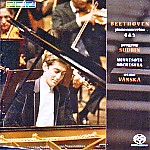Expectations ran high in anticipation of this release, and they have not been disappointed. BIS just completed a partially successful Beethoven piano concerto series in which an often inspired Ronald Brautigam was shackled to an expressively challenged and period-pedantic Andrew Parrott. Here, both conductor and soloist are consistently operating on the same exciting wavelength. Osmo Vänskä’s credentials as a Beethoven conductor remain impressive. He understands the importance of accents, of sforzandos that enliven but don’t disrupt the melodic line. He never fails to balance Beethoven’s all-important bass lines clearly (opening tutti of the Fourth concerto), or to give sufficient prominence to those rapid accompaniments in repeated notes that energize the music’s texture (first movement of the “Emperor”). The orchestra plays with real intensity as well as expressiveness, offering the perfect collaboration for Yevgeny Sudbin’s contributions.
These are no less memorable. It’s sometimes said that you can tell how well the Fourth concerto will go from the pianist’s handling of the opening phrase, and there’s some truth to this observation. Sudbin plays it with simple dignity, refuses to make a big ritard at the end, and strictly observes Beethoven’s eighth-note value on the last note. The result is that the phrase sounds incomplete (as it should), arousing expectation and carrying the music through the pause to the hesitant entry of the violins in a different key. He understands that some of Beethoven’s biggest surprises arrive softly. In short, there is a true give-and-take between soloist and orchestra throughout these performances that makes them especially engaging.
The slow movement is wonderful: Vänskä finds a tempo–a touch slower than usual–that allows him to observe the “sempre staccato” indication and provide the necessary rhetorical weight to the strings’ emphatic proclamations, while Sudbin’s answers represent the soul of inward poetry. The finale, by contrast, is dazzling and uninhibited, with trumpets and drums cutting through the texture, and Sudbin’s fast passage-work is joyous but never tonally forced or hard.
Indeed, it may sound odd to say so, but one of the joys of Sudbin’s playing is his handling of simple scales and runs. Mozart once remarked how he delighted in making them “go like oil”, with perfect smoothness, and that’s just how Sudbin handles them. There are a lot of scales in these pieces, in the “Emperor” particularly. In its first movement, each major entrance (and exit) of the piano features a simple scale, and anyone who can make these as memorable and beautiful as Sudbin does is a major talent indeed. He has a particular way, in the Adagio for example, of rendering the melodic line expressive through control of touch and dynamics without distorting the rhythm, and this makes the music touching without excess sentimentality. It all seems very much in the spirit of Beethoven, as is the robust and perfectly-timed manner in which he and Väskä launch the finale–grand in all of the right ways. The coda’s huge, amazingly well-judged diminuendo and ritard only confirm the generally masterful impression. Gorgeous SACD sonics make this release a Beethoven experience you will not want to miss. [1/10/2011]
































